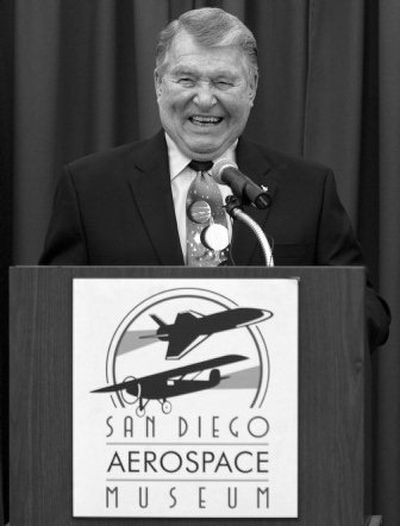NASA pioneer Wally Schirra, 84, dies

Walter Schirra, the only man to fly all three of NASA’s first-generation spaceships, died Thursday from a heart attack in La Jolla, Calif. He was 84.
Schirra’s death leaves only two of America’s first astronauts, known as the Mercury Seven, still living. The survivors are John Glenn, 85, and Scott Carpenter, 82.
A highly skilled pilot and ebullient practical joker, Schirra commanded the Mercury, Gemini and Apollo spacecraft in a span of only six years. Schirra, best known as Wally, never set foot on the moon, but his flights were crucial steppingstones in an era when rockets regularly blew up and outer space was an unexplored frontier.
The lives of the Mercury Seven and the space program’s early days were chronicled in the book and movie “The Right Stuff.” Schirra and the others “were the epitome of the right stuff,” said space historian Roger Launius of the National Air and Space Museum. “He was one of the originals.”
A native of Hackensack, N.J., Schirra graduated from the Naval Academy and served as a Navy test pilot. That qualified him for the astronaut corps, made up in the early 1960s of military test pilots because of their flying skills and familiarity with danger.
Schirra “had the test-pilot’s can-do spirit, and he was willing to sign up for the risks,” said Eugene Kranz, a legendary NASA flight director who helped run Schirra’s missions.
Schirra became the fifth American in space when, riding in the tiny Mercury capsule, he circled the Earth six times. His textbook-perfect flight helped restore NASA’s confidence in the astronaut corps, which took a beating after a troubled Mercury flight by Carpenter four months earlier.
Schirra’s 1965 Gemini mission included the first close approach by two U.S. spacecraft, a necessary prelude to the Apollo missions that landed humans on the moon. His flight in 1968, which put the Apollo through a trial run, gave NASA the confidence to send humans to orbit the moon, allowing the U.S. to beat the Soviet Union to lunar orbit.
That Apollo flight was also historic for the bad relations between the astronauts and Mission Control. Plagued by an ambitious to-do list and a bad cold, Schirra snapped at flight controllers and refused to follow some instructions. “I have had it up to here today,” he told Mission Control near the end of his flight.
Even in a man known for candor, that level of testiness was unusual.
After leaving NASA, Schirra worked for CBS, appearing with anchor Walter Cronkite as a commentator on the space program. As the first human to suffer a head cold in space, Schirra also became a pitchman for cold remedy Actifed.